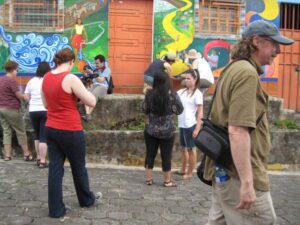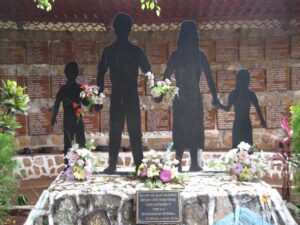With his unique storytelling skills, a Mary Baldwin University professor is helping bring justice to one Central American village 32 years after a massacre there ended hundreds of lives.

In recent years, Assistant Professor of Film Allan Moyé captured testimony from residents of the Salvadoran village of El Mozote, where in 1981 during a civil war, the state-supported army massacred more than 800 people. Last month, judges from the Inter-American Court of Human Rights (IACHR) — who viewed Moyé’s work — ruled against the state of El Salvador, making the government and army responsible for violations of human rights against the civilian population. The panel recommended trial against the perpetrators and economic assistance to family members of the victims.
“This ruling was possible, in part, thanks to the fact that the judges could hear the voices and could see the faces of the people who were telling their stories with pain as fresh as if the massacre had occurred the day before and with a sense of lament that has no healing,” said Mary Baldwin Artist-in-Residence Claudia Bernardi, who facilitated the interaction between Moyé and El Mozote residents. “It was thanks to Allan Moyé that those stories were captured on film and seen by the judges.”
While Bernardi and another volunteer conductied interviews, Moyé filmed the testimony on three visits to El Salvador — May Term trips with Mary Baldwin students in 2010 and 2011 and a separate visit in summer 2010. Moyé said the locals eventually began to recognize him, which helped build trust between him and the families, who find it difficult to talk about the horrific events of December 11, 1981.
“We developed a great friendship with these people,” Moyé said. “They were relatives [of the victims], people who barely escaped.”
Bernardi is known for her efforts to bring peace through art in war-weary countries, notably by creating colorful murals. She established the Walls of Hope school and open studio in Perquin, a neighboring village of El Mozote, where families — and culture — were nearly obliterated by the killings.
The school’s mission and the presence of those working within the school have helped put residents at ease.
“Claudia recognized this right away,” Moyé said. “They’ve never talked about [the massacre] before. We knew we had some original things here. We were honored to take these videos and we were all relieved [to learn about the judges’ ruling]. We all want justice for these people.”
The government of El Salvador apologized for the El Mozote massacre in December 2011. In its ruling last month, the Costa Rica-based IACHR also stressed that a 20-year-old amnesty law does not cover war crimes committed during El Salvador’s 12-year civil war, during which the mass killing took place.

“I have no words to thank Alonso [Moyé] for his willingness to share his expertise as a filmmaker and for his sensitivity, warmth, and respect towards the victims who felt comfortable enough with him to tell their stories in front of his camera,” Bernardi said. “The resolution of justice in this case of El Mozote is one new link in the never-ending effort of peoples from many lands to imagine a more just world, more beautiful and less violent.”